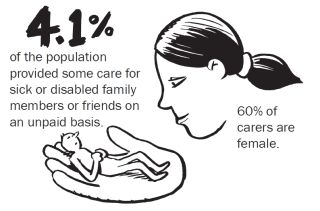Do we really value caring?

A recent study by the Irish Human Rights and Equality Commission and the Economic and Social Research Institute presents some very interesting data on caring and unpaid work in Ireland. In summary the report found that:
- 45% of women and 29% of men provide care for others on a daily basis.
- Adults in Ireland spend an average of 16 hours per week on caring and 14.5 hours on housework.
- The time spent on care and housework combined is the third highest in the EU, according to the study.
- The majority (55%) of those providing unpaid care on a daily basis in Ireland are in employment.
- Ireland has the third highest weekly hours of unpaid work for both men and women across the EU28. This reflects the relatively low State involvement in support for caring and sees Ireland more in line with Southern and Eastern European Countries, rather than with Scandinavian and Western EU States.
- On average women spend double the time of men on caring and more than twice as much time on housework. A substantial gender gap persists even among men and women doing the same amount of paid work.
- The gap between women and men’s hours of unpaid work is particularly wide in Ireland.
This study builds on the findings from Census 2016 which found that found that 4.1 per cent of the population provided some care for sick or disabled family members or friends on an unpaid basis. This figure equates to 195,263 people. The dominant caring role played by women was highlighted by the fact that 118,151 (60.5 per cent) of these care providers were female. When assessed by length of time, the census found that a total of 6,608,515 hours of care were provided by carers each week, representing an average of 38.3 hours of unpaid help and assistance each. Two thirds of this volume of care was provided by female carers. Using the minimum wage as a simple (if unrealistically low) benchmark to establish the benefit which carers provide each year suggests that Ireland’s carers provide care valued at more than €3.14bn per annum (calculation based on 2016 minimum wage of €9.15 per hour.)
These studies highlight the minimal recognition the work of Ireland’s carers receives despite the essential role their work plays in society. At a Government level it is time to develop policy that will truly support carers, ensuring they have access to the services they require, and policies that support a combination of care and employment for a start. In addition Social Justice Ireland believes that further policy reforms should be introduced to reduce the financial and emotional pressures on carers. In particular, these should focus on addressing the poverty experienced by many carers and their families alongside increasing the provision of respite care for carers and for those for whom they care. In this context, the 24 hour responsibilities of carers contrast with the improvements over recent years in employment legislation setting limits on working-hours of people in paid employment.